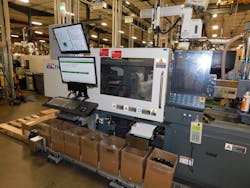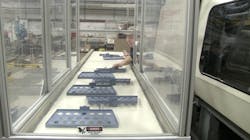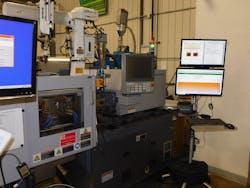Having used a combination of QuickBooks and Solarsoft ERP for years to run its manufacturing operations, Vital Plastics—a high-volume plastic injection molding and assembly company—experienced challenges integrating the two systems to get visibility across manufacturing, accounting, and finance.
To address these challenges, Vital Plastics standardized on the DelmiaWorks manufacturing ERP (enterprise resources planning) system from Dassault Systèmes.
A key aspect of Vital Plastics implementation of DelmiaWorks ERP involved use of the ERP’s electronic data interchange (EDI) module to ensure customer order accuracy. In Vital Plastics EDI order setup, the company receives EDI files from customers, including new orders that need to be fulfilled by a specific date.
Matt Fish, president of Vital Plastics, says, a typical customer’s EDI order file will have several hundred or thousands of lines of data and orders. The DelmiaWorks’ EDI Module populates sales orders so the inbound EDI orders can be scheduled for production using the DelmiaWorks manufacturing execution system (MES) functionality.
With more than 80% of Vital Plastics’ inbound orders now EDI-based, the company’s scheduling department saves about 40 hours a week. In addition, Vital Plastics uses EDI for more than 80% of its material purchases, allowing the company to better plan production runs with fewer disruptions due to material outages.
Complex orders and reporting
The Master Scheduler component of the MES module in DelmiaWorks ERP is also used to address complex scheduling resulting from special order requirements contained in many of Vital Plastics customer orders.
Fish noted that, prior to Vital Plastics use of DelmiaWorks ERP, there were instances when there were no clear insights into constraints within the system and out on the floor, whether it was with people, machines, materials, or ancillary equipment. This sometimes led to overpromising and underdelivering situations.
With the DelmiaWorks ERP, Vital Plastics has been able to create “custom material dispatch reports that help us get in front of material drying and staging needs,” adds Fish. “We can now prepare and stage our materials based on the time needed to prep the materials.”
Vital Plastics also uses the conflict evaluator functionality within the Master Scheduler to understand ancillary equipment constraints and their impact on production schedules.
The DelmiaWorks ERP allows Vital Plastics to mine data in the system to create ad hoc, real-time analysis of manufacturing constraints. “I can easily extract and mine data directly from the data tables pretty quickly. And we can react on the fly and then get back to the customers right away if there is a problem with a material constraint or another issue that means they’ll need to push the request date out," Fish explains.
Customer collaboration
Using Dassault Systèmes SolidWorks simulation software, Vital Plastics has also implemented a two-stage design-for-manufacturing (DFM) process to provide customized products to customers.
During the quoting phase, part models are evaluated and a flow simulation is conducted to roughly determine the cycle time, according to Jack Pollitt, engineering manager at Vital Plastics. He says this helps customers see how part design tradeoffs, tooling concerns, and decisions on materials can impact the final design.
Results in action
One of the biggest impacts to Vital Plastics’ operations resulting from its use of DelmiaWorks ERP is the speed in which it can fulfill to customer orders. Fish says the ability to synchronize purchasing, receiving, master scheduling, and customer forecasting means that, in some cases, Vital Plastics can accept an order in the morning and have it complete and ready for shipment that afternoon. Such quick turnarounds may not be typical, Fish says, but it happens now.
Another significant result is the growth of Vital Plastics’ production operations and revenues. Since implementing DelmiaWorks ERP, the manufacturer has grown from 30 to 60 injection molding machines and increased performance in ways that have led to a 25% increase in revenue growth.
The insights delivered by DelmiaWorks ERP are an important aspect of Vital Plastics’ revenue and operations expansion. The company uses the ERP system to automatically deliver 60 reports generated with IQAlert to its engineering, production scheduling, and support teams at 5:00 a.m. every morning. These reports include data on open order backlogs, on-hand inventory by customer, open maintenance, repair and operations work orders, machine set-ups with outputs that vary from controlled set-up process, and inventory reports.
The move to DelmiaWorks has also expanded how Vital Plastics can share data with its workforce. The company now has 52-in. and 70-in. monitors on the production floor showing data on every work center, such as its current status, if it's faster than cycle, running slow, or down. Having this information widely accessible has reduced the number of changeovers and increased collaboration among teams.
Leaders relevant to this article:





